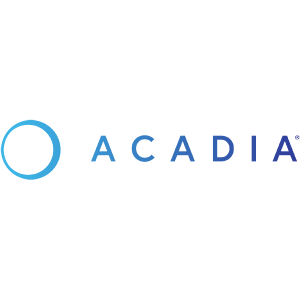Acadia Pharmaceuticals Submits Marketing Authorization Application to the European Medicines Agency for Trofinetide for the Treatment of Rett Syndrome
-- Filing marks company’s first Marketing Authorization Application in
“This application underscores our continued dedication to the Rett community, and our commitment to making a meaningful impact for people living with Rett syndrome and their caregivers in the EU, who currently have no approved treatment options specifically for this condition,” said Catherine Owen Adams, Acadia’s Chief Executive Officer. “We look forward to working with the EMA to address this unmet need in the hopes of potentially bringing this therapy to families who are impacted by Rett syndrome.”
The MAA is supported by positive results from the pivotal Phase 3 LAVENDER™ study evaluating the efficacy and safety of trofinetide versus placebo in 187 girls and young women five to 20 years of age with Rett syndrome. The co-primary endpoints were change from baseline in the Rett Syndrome Behaviour Questionnaire (RSBQ) total score, a caregiver assessment, and Clinical Global Impression–Improvement (CGI-I) scale score, clinician perspective, at week 12; both were statistically significant. The RSBQ is a 45-item rating scale completed by the caregiver that assesses a range of symptoms of Rett syndrome (breathing, hand movements or stereotypies, repetitive behaviors, night-time behaviors, vocalizations, facial expressions, eye gaze, and mood). The key secondary endpoint measuring the change from baseline to week 12 in the Communication and Symbolic Behavior Scales Development Profile™ Infant-Toddler Checklist–Social composite score (CSBS-DP-IT–Social) was also statistically significant when compared to placebo.1
“Rett syndrome is a severe and complex neurodevelopmental disorder that manifests differently in each affected person, leading to a wide range of symptoms over the course of their lives,” said Becky Jenner, President of Rett Syndrome Europe. “The Rett syndrome community in
About Rett Syndrome
Rett syndrome is a rare, complex, neurodevelopmental disorder that may occur over four stages and occurs in approximately one of every 10,000 to 15,000 female births worldwide.2-4 A child with Rett syndrome exhibits an early period of apparently normal development until six to 18 months, when their skills seem to slow down or stagnate. This is typically followed by a duration of regression when the child loses acquired communication skills and purposeful hand use. The child may then experience a plateau period in which they show mild recovery in cognitive interests, but body movements remain severely diminished. As they age, those living with Rett may continue to experience a stage of motor deterioration which can last the rest of the patient’s life.3 Rett syndrome is typically caused by a genetic mutation on the MECP2 gene.5 In preclinical studies, deficiency in MeCP2 function is thought to lead to impairment in synaptic communication, and the deficits in synaptic function may be associated with Rett manifestations.5-7
Symptoms of Rett syndrome may also include development of hand stereotypies, such as hand wringing and clapping, and gait abnormalities.8 Most people living with Rett syndrome typically live into adulthood and require round-the-clock care.2,9
About Trofinetide
Trofinetide is a synthetic analog of the N-terminal tripeptide of insulin-like growth factor 1 (IGF-1). The mechanism by which trofinetide exerts therapeutic effects in patients with Rett syndrome is unknown. In animal studies, trofinetide has been shown to increase branching of dendrites and synaptic plasticity signals.10
About Acadia Pharmaceuticals Inc.
Acadia is advancing breakthroughs in neuroscience to elevate life. Since our founding we have been working at the forefront of healthcare to bring vital solutions to people who need them most. We developed and commercialized the first and only FDA-approved drug to treat hallucinations and delusions associated with Parkinson’s disease psychosis and the first and only approved drug in
Forward-Looking Statements
This press release contains forward-looking statements within the meaning of the Private Securities Litigation Reform Act of 1995. Forward-looking statements include all statements other than statements of historical fact and can be identified by terms such as “intends,” “may,” “will,” “should,” “can,” “could,” “would,” “expects,” “plans,” “anticipates,” “believes,” “estimates,” “projects,” “predicts,” “potential” and similar expressions (including the negative thereof) intended to identify forward-looking statements. Forward-looking statements contained in this press release, include, but are not limited to, statements about: (i) the potential approval of trofinetide as the first option in the European Union for the treatment of Rett syndrome, (ii) the efficacy and safety profile of trofinetide for patients with Rett syndrome, (iii) market acceptance in EU, including the importance of trofinetide for the treatment of Rett syndrome, if approved, for Rett patients or families of patients with Rett syndrome and (iv) the ability for trofinetide to address the unmet medical needs of Europeans living with Rett syndrome. Forward-looking statements are subject to known and unknown risks, uncertainties, assumptions, and other factors that may cause our actual results, performance or achievements to differ materially and adversely from those anticipated or implied by our forward-looking statements. Such risks, uncertainties, assumptions and other factors include, but are not limited to: the ability for trofinetide to deliver efficacious and safe results to patients, if approved, our dependency on the continued successful commercialization of DAYBUE™ in
References
1 Neul JL, Percy AK, Benke TA et al. Trofinetide for the treatment of Rett syndrome: a randomized phase 3 study. Nat Med. 2023; 29: 1468–1475
2 Fu C, Armstrong D, Marsh E, et al. Consensus guidelines on managing Rett syndrome across the lifespan. BMJ Paediatrics Open. 2020; 4: 1-14.
3 Kyle SM, Vashi N, Justice MJ. Rett syndrome: a neurological disorder with metabolic components. Open Biol. 2018; 8: 170216.
4 May DM, Neul JL, Satija A, et al. Real-world clinical management of individuals with Rett syndrome: a physician survey. J of Med Econ. 26(1), 1570–1580.
5 Amir RE, Van den Veyver IB, Wan M, et al. Rett syndrome is caused by mutations in X-linked MECP2, encoding methyl-CpG-binding protein 2. Nat Genet. 1999; 23(2): 185-188.
6 Fukuda T, Itoh M, Ichikawa T, et al. Delayed maturation of neuronal architecture and synaptogenesis in cerebral cortex of Mecp2-deficient mice. J Neuropathol Exp Neurol. 2005; 64(6): 537-544.
7 Asaka Y, Jugloff DG, Zhang L, et al. Hippocampal synaptic plasticity is impaired in the Mecp2-null mouse model of Rett syndrome. Neurobiol Dis. 2006; 21(1): 217-227.
8 Neul JL, Kaufmann WE, Glaze DG, et al. Rett syndrome: revised diagnostic criteria and nomenclature. Ann Neurol. 2010; 68(6): 944-950.
9 Daniel C, Tarquinio DO, Hou W, et al. The changing face of survival in Rett syndrome and MECP2-related disorders. Pediatr Neurol. 2015; 53(5): 402-411.
10 Acadia Pharmaceuticals Inc., Data on file.
View source version on businesswire.com: https://www.businesswire.com/news/home/20250114935731/en/
Investor Contact:
Acadia Pharmaceuticals Inc.
Al Kildani
(858) 261-2872
ir@acadia-pharm.com
Media Contact:
Acadia Pharmaceuticals Inc.
Deb Kazenelson
(818) 395-3043
media@acadia-pharm.com
Source: Acadia Pharmaceuticals Inc.









